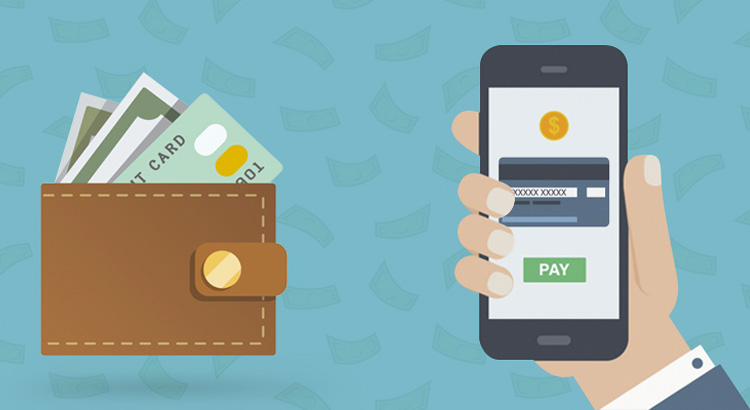With fintech developing rapidly, people are interested in the similarities and differences between mobile wallets and traditional banks. As mobile apps become more popular, many users are starting to compare their pros and cons with the reliability and services of traditional banks. This comparison helps people make the best choice for their daily financial needs in terms of ease of use, security, convenience, and services.
The Rise of Mobile Digital Wallets
Mobile accounts have also become very popular due to the rapid adoption of smartphones and mobile apps. People can store money in these digital wallets, pay with a tap, and even link multiple bank accounts or credit cards. People are increasingly using contactless payments and app-based services. Mobile wallets are so convenient that traditional banks are struggling to keep up. Tech-savvy people need mobile wallets to pay for things like coffee, online shopping, and transferring money to friends.
Traditional Banks and Their Long-Term Reliability
Traditional banks have long been the most important component of personal banking. In addition to storing and sending money, banks also offer a variety of other services, such as loans, credit services, investment opportunities, and financial advice. Banks have physical locations and offer offline services, giving many customers a sense of trust and security that digital alternatives may not provide. For generations, people have relied on banks to manage their money, and many still value the personalized service and wide range of services these companies offer.
Convenience for Everyday Business
Convenience is one of the biggest advantages of mobile accounts. Users can do most things instantly with just a smartphone and an internet connection. They don’t have to withdraw money, go to an ATM, or even remember their PIN. It takes just seconds to make payments, split bills, and shop online. Traditional banks can be more time-consuming, especially when transferring money between banks or dealing with customer service issues.
Security and Fraud Protection
People who handle money value security, and both mobile wallets and traditional banks invest heavily in the safety of their users. Banks typically have sophisticated processes in place to detect fraud, ensure customer authenticity, and closely monitor transactions. They also have legal and insurance systems in place to protect against loss of funds. Although mobile wallets are new, they protect user data and transactions with advanced encryption, biometric authentication, and app-based verification methods. However, mobile wallets are more vulnerable to phishing attacks and hacks if users do not pay attention to the security of their device or if they fall victim to scams.
Accessible to Everyone, Worldwide
Mobile wallets are the easiest way to access cash, especially in areas where banking regulations are weak. In many developing countries, people no longer need a bank account to send and receive payments, save money, and participate in economic activities. Instead, mobile wallets have changed the way people interact with money. Traditional banks require paper documents, a physical location, and people who know more about money to use them. This makes it harder for low-income earners or those living in rural areas to access these services. Mobile wallets make financial transactions easy for anyone with a mobile phone.
Features and How They Fit into Modern Life
The idea behind mobile accounts is that they should fit perfectly into the digital lifestyle. They can be compatible with apps, support QR code payments, offer loyalty rewards, and connect to social media sites. This integration makes it easier for users to work and allows them to manage their money more flexibly. Although traditional banks are gradually updating their services, they still lag behind in this area. Many banking apps do not offer as smooth an experience as the best mobile wallets, and their features are often limited compared to mobile wallets.
Fees and Transaction Costs
Fees and transaction prices are also important factors to consider. Mobile wallets often allow you to transfer money to others for free and make payments quickly and easily, especially for small amounts. They eliminate fees like minimum balances or maintenance fees that most banks charge. In contrast, standard banks may charge for services like using an ATM, transferring money abroad, or protecting your account from overdrafts. However, banks also offer interest-bearing accounts and other valuable financial products that mobile wallets typically don’t offer.
Troubleshooting and Customer Service
When problems arise, it’s crucial to be able to get help quickly. Traditional banks often have established customer service methods, such as branch services, call centers, and online help. This gives users multiple ways to resolve issues. With mobile wallets, especially those from newer or smaller companies, there may not be as many ways to get help. Additionally, resolving issues can take longer or be more frustrating due to automation and the lack of direct contact. Still, larger mobile money providers are constantly improving their customer service to stay ahead of the competition.
Plan your Finances and Benefit
When it comes to long-term planning, traditional banks are still the best choice. They offer mortgages, retirement accounts, savings plans, and professional financial assistance. These services are highly sought after by people who want to get rich, buy a home, or plan their future. While mobile devices are great for everyday use, they generally do not offer these services yet. Some banks are starting to offer savings and loans, but their range of services is not as extensive as traditional banks.
Trust and Institutional Reputation
Where people keep their money depends on how much trust they have in the institution. Traditional banks have built their image over the years, even centuries. They are regulated by the government, insured, and have the resources to solve financial problems. While mobile wallets are new, they still need to build trust with customers over time. Even though regulations are improving, many people are still hesitant to move all their financial activities to mobile wallets because they perceive risks and a lack of commitment.
Conclusion
There is no single answer to the question of which is better: mobile wallets or traditional banks. They each have their pros and cons. Mobile wallets are great for everyday activities and for those looking for digital solutions because they are easy to use, fast, and convenient. For long-term planning and complex financial needs, traditional banks are better because they offer a wider range of financial services, more personalized support, and a higher level of institutional trust. Ultimately, the best answer may be a little of both: use a mobile wallet for everyday convenience and a bank for all your financial needs.
FAQs
1. Is it safe to use mobile money for purchases?
Strong encryption and biometric security make mobile wallets generally more secure. However, for larger transactions, it is best to use a reputable app and make sure all security features are enabled.
2. Can mobile wallets replace banks entirely?
Not yet. While mobile accounts are great for everyday use, they do not have many of the advanced services and security features that a bank account does.
3. Do mobile wallets cost?
Most mobile wallets don’t charge fees for simple transfers. However, you may be charged for premium services, withdrawals, or using a mobile wallet abroad.
4. Do I earn interest on my mobile wallet?
Some mobile wallets allow you to store money and earn interest, but the rates and terms aren’t always as favorable as those offered by a bank.
5. Which is better for budgeting: a bank or a mobile wallet?
Most mobile wallets have built-in budgeting tools that make it easier to track your spending. Banks sometimes also offer budgeting tools via an app or online platform.



